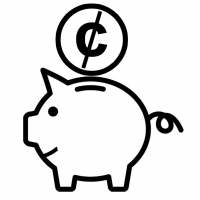Believe it or not I’m going to encourage you to spend money to save money by buying a house, if you haven’t already.
Home-buying got a bad rap during the bubble years, but I am still a big believer for a very fundamental reason: it’s the one investment you can make with money you have to spend anyway. After all, you have to pay money to live somewhere.
If you currently rent, it’s your biggest expense, but you can make that money serve two purposes by buying a place instead. You get a nest and a nest egg. You can’t sleep in a stock and bonds don’t keep you warm in the winter —but a home takes care of both. Besides, many people can’t afford to pay their rent and buy stocks and bonds. According to the Federal Reserve, the median net worth of homeowners is $234,000; while for renters its $5,100. Why? Because buying a house is a forced savings plan where you can shelter your money and shelter your family.
But wait, there’s more! What other investment enables you to use somebody else’s money to make money? That’s exactly what happens when your house appreciates in value and you sell it for a profit. Even though you still owe money on your mortgage, the people at the mortgage company don’t make you share the proceeds with them, now do they?
You also get lucrative tax benefits, at least for now. Congress is considering changing this. Right now, as you probably know, the IRS allows you to deduct the interest you pay on your mortgage from your federal income taxes. It’s the government’s way of supporting home ownership. Even on a 200-thousand dollar house or condo, you can save more than 2-thousand dollars a year thanks to this tax break.
Furthermore, by buying a house you are locking in your monthly housing payment. By contrast, rent is almost guaranteed to go up. Since 1990, rents have risen more than three percent a year, according to Reis, Inc., a real estate forecasting firm. If you buy a house and choose a 30-year fixed rate mortgage, your housing payment is set for decades. Let’s do the math. Say your rent is $1000 a month, but, remember, it goes up 3 percent a year, so over 10 years, you will spend $137,566 on rent. But if you put that same thousand dollars toward a fixed rate mortgage payment, your cost over ten years would be $120,000 dollars. That’s a savings of $17,566! Sweet!
Rents go up by Here’s my final argument in favor of buying a house: property values have been going up an average of six percent a year since 1968. So, I say, take a gamble on a possible gain. What’s the worst that could happen? You might lose money? Go for the potential earnings instead of the sure loss. Because, if you keep paying rent, you will definitely lose money.

